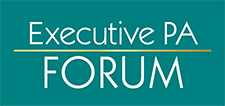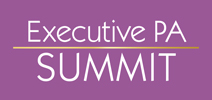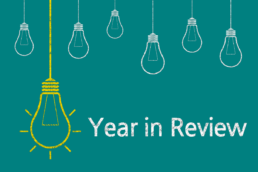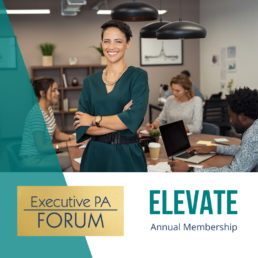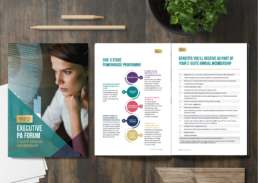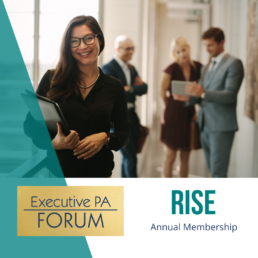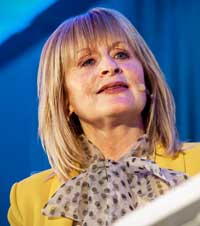Expert Advice on Performance Reviews and Appraisals
Performance Reviews and Appraisals - Anxiety-inducing or an Opportunity to Re-focus?
Have you got a performance appraisal coming up? Do you even have an annual review in place? How often do you sit down with the person(s) you support and/or HR to discuss your career path and progression?
Now is the best time of year to reflect on your year gone by, analyse where you could be better recognised and rewarded, and set your career goals for 2024. We have some stellar advice and resources to help you if you have a review coming up so you can be best prepared. If this is not something you have had in a while (or ever) in your organisation, this advice should resonate with you and motivate you to make it happen.
Be Real. Be Clear
Career Consultant Siobhan Kelly founder of Mosaic Consultancy shared with us fantastic advice and guidance coming up to review time
- Don't assume your manager/Executive knows what you've done over the previous 12 months. They don't. Give examples related to the KPIs of your role and the core values of the company.
- Include the results and the value added to the executive/their team/wider company. Take the time to reflect on the wide ranging impact your work has.
- Don't tell people what you did, show HOW you did it e.g. collaborating with remote teams etc. and include results.
- Under no circumstances give yourself a 3 if you really deserve a 5 on the scoring metric. Some people get embarrassed to be seen rating themselves so highly. Beat that inner critic with a stick if you need to and yourself the most honest and accurate score.
- Use the opportunity to negotiate for your career aspirations for the next 12 months. Do you want to get support for an in-depth training course, join a professional association, or volunteer in area that will help you progress in your career? Now is the time to say it and explain why it will help you in your role, and make you an even more valuable member of the team and the wider organisation.
- Take the time to prepare ‘a highlight reel’ document that they can take away with them. Highlights that align with your appraisal, your achievements, your future goals. There should be no confusion in relation to you achieving or indeed over-achieving on your KPIs and total clarity on what you need going forward.
- A closed mouth won't get fed. I said this at the Executive PA Summit, and it is something I firmly believe. If you want a pay rise, bonus, promotion, new responsibilities SPEAK UP. This is an ideal time to lay everything on the table and discuss with your executive. You can tell them what you want and ask them what steps you need to take to get them and agree a timeline.

Seize the Opportunity
Vision & Leadership Coach and Mentor Lisa Mitten shares her advice when it comes to preparing for your performance review:
- Take time to reflect on the past year, create clear notes on what worked and what didn’t work for you. Be honest with yourself.
- Remember, feedback is an amazing opportunity to grow and learn. Constructive feedback is a privilege, it’s your window to develop your strengths and skills.
- Take time to prepare your own feedback to your executive/manager and come to your appraisal with possible solutions, going forward, with regard to what didn’t work or go as planned etc. Also consider what supports and resources you need in place to help you do your best work.
- Create clarity around the direction you want to move towards in the coming year. Your appraisal is an opportunity to sell yourself, if there are any projects, areas of the business or trainings you would like to do / get involved in, now is your time to make the suggestion.
- Keep an open mind.
- Be confident and use your voice, this is your chance to shine!

Task Tracking and Key Questions
We recently learned some great advice at the recent Executive PA Summit from Paula Brady, former EA and now Performance Improvement Specialist who works with Senior Leadership to get the best out of them. Paula recommends asking two key questions of the person(s) you support:
- What do I do on a daily basis that helps make your life easier?
- What else can I do more often that will help make your life easier?
She also advised to keep a track of your tasks and activities every day and week so that you yourself have an overview of the work that you do but that you can also demonstrate more clearly your contribution. Here is an example of helpful Weekly Task Tracker sheet that Lynn Walder shared on LinkedIn recently, a great way of both reviewing and demonstrating the results of your performance. You can make a copy, choose the headings that apply to you and get tracking!

Aligning Personal and Organisational Strategy
A massive A-HA moment at the recent Executive PA Summit was during Siobhain Danaher's talk on decision fatigue and decision making. Set a personal strategy for yourself for the next year. It is possible to then look at how this aligns with the organisational strategy. Chances are that you can see overlap and a cohesion.
If you repeatedly get sucked into taking on tasks and activities that are extraneous to your priority responsibilities, that repeatedly fall outside the scope of either of these strategies you have to consider if the rest of your work will suffer. Ultimately you want to complete the tasks and work on the projects that will enable your leader and the organisation to achieve success.

What is a career conversation?
In case you haven’t had a review recently (or ever at your current organisation) we recently came across an excellent model and tool that may be of help to you. The Career Equation by Erica Sosna encourages you to have a career conversation with your manager. According to Erica, a career conversation is a valuable opportunity for you and your manager to reflect on your career interests and the opportunities that exist for you. It is a conversation that you own and lead about your direction of travel in your career. You can use it to share your goals, plans and hopes and to ask for support, time, mentorship or stretch opportunities that could help you get there.
Erica recommends the following for a successful career conversation:
- Book a quiet, private space - no distractions for you or the person you support.
- Allow at least an hour for it.
- Send an invite that sets out the purpose of the conversation and the high level agenda – set out below.
- Bring copies of your career timeline, a career design statement (how you want your career to look), career goals and career plan to share.
A career conversation can act as an exploration of the kinds of career experiences you would like to have, and setting some career goals that excite and engage you will motivate you to create a plan that helps make these a reality.
A note from author Fiona:
If you want to explore what your ideal career will look like and how to get yourself there from where you are now, you should strongly consider our Executive PA Forum Elevate Membership Programme.
While we believe that you should have a separate meeting to discuss your training and development needs, we know it’s not always realistic so your performance review could be your best opportunity to broach the subject.
If you are going to bring up the topic of getting support for your training and development during your appraisal, make sure to research the courses and training that are available, accessible and fit around your schedule.
Ask yourself why you want / need a particular training or course, then narrow your search to the choices that will deliver the best for you.
Once you have chosen your preferred training/courses, you should be able to explain to your Manager/HR:
- How this training/course will benefit you.
- How this training/course will benefit your organisation.
These are the two most important elements when it comes to preparing to ask for support of your professional development. Once you have answered these questions, you will be more confident in looking for sign off -and you will be more likely to get it.
*Additional - for every course, training and membership option we offer at Executive PA Forum, we have an Investment in Professional Development Proposal to help you explain the features and benefits to your HR/management team. Please get in touch should you require one - even if it's not for one of our courses or memberships we would be delighted to help you. Contact fiona@executivepaforum.com for more.
Below are some training options to consider with the Executive PA Forum in the coming year:
*The PowerHouse Programme a powerful transformational journey in professional and personal development that is included in ELEVATE
*The Advanced Executive Assistant Diploma. Enrollment deadline for 2024 is January 15th 2024.
The Adam Fidler Academy is now enrolling for Level 5 Level 6 and certified FETAC Diploma. For a more in depth explanation of time requirements, workload, expectations, and cost please contact aisling@executivepaforum.com.
The Power EA International Masterclass - For C-suite professionals seeking a higher, transformative learning experience.
Rise Programme Multiple professional development opportunities throughout the year.
Executive PA Summit 2024 If you can only commit to one training event next year, make sure it’s this one - our annual 2 day conference to include workshops, networking and learning, taking place May 16th & 17th 2024. Register here.
If you need any other advice or help with any of the above, please get in touch!
TAKING CONTROL
TAKING CONTROL…
Other episodes include:
✅ Reclaiming your power – only YOU are responsible for creating your current reality and future career
Career Advancement Styles | Siobhan Kelly, Mosaic Consultancy
Career Advancement Styles
I wish I'd known about this concept before I started my career in recruitment. We all have them, in the same way that we all have a personal brand.
If you're not aware of what type of career advancement style you have, you will not know what to do to change it and/or develop it. And this is not just about changing jobs, it's about career progression so this is for everyone to be aware of at any stage in their career.
Lets see if you relate to any or all of the following questions:
Have you ever seen that other people are being selected for promotion or are garnering attention for the work that they do?
You work just as hard or harder but you are overlooked?
Are you wanting to change your job within your current company?
Are you wanting to be approached by recruiters or hiring managers from other companies?
Maybe you just want to change your company or potentially your industry?
So which style are you? (I want you to have your pen and your paper ready)
There are many different types of career advancement styles, but I have narrowed it down to just four. Take an honest look at what you've done in your current job and what you will be doing, and even possibly what you have done in your previous job(s).
The Climber
This person is not shy about putting themselves forward publicly for different types of projects. They are individuals who seek advancement in their organisations by asking for varied assignments, working longer hours, networking and seeking greater visibility. These network gurus rub shoulders with the leadership team. Quite a few of the examples that I've been speaking to said that they didn't like the idea of the rubbing shoulders because it seemed disingenuous. We have to try and own the language and that is used in the business world. 'Rubbing shoulders' or becoming a climber doesn't necessarily mean that you have to be disingenuous. How each person shows up as a climber could look completely different because we all have to be loyal to ourselves.
Climbers share their wins and they're not shy about it. They also share these wins with the right people!
The Hedger
Hedgers use all of the career tactics available to them to advance inside and outside of their current organisations. Hedgers don't always push themselves, but tend to highlight their accomplishments to the right people. We've seen a correlation between these behaviours of Hedgers and Climbers and being selected for promotions and pay rises. They take ownership for the work they've done and they are recognised for the contributions that they make.
The Scanner
Scanners are individuals who monitor the job market closely and are ready to change jobs. In this current market, we cannot sit and wait for opportunities to come, we have to be somewhat proactive. Scanners often are frustrated when they see the Hedgers or Climbers get promoted, when they're doing the same level of work. However, scanners may be able to identify a lack of confidence in themselves to publicly own their work and accomplishments.
The Coaster
Coasters are individuals who do little to see career advancement. It doesn't mean that they coast in their job, they could be phenomenal at their job, but they're more like workhorses. They put their head down, they get the job done and then they don't talk about it.
This is one of the main reasons that coasters don't get selected for projects, nor get a pay rise, nor the promotion they deserve. Nobody knows about it, it goes under the radar and you'll never be seen or heard with all the noise from the Climbers and Hedgers
What to do now ...
Write down where you think you fall. Remember that this is individual to you. It doesn't mean that you have to go into work tomorrow and be super extravagant and acting like a different person. What's one step that you could do to get to the climber group. Let's take ownership of this, promote yourself into one of the other groups.
Make small changes. There are a variety of different steps you could take to further your career whether you're staying in your current company or whether you're moving on to another company or another industry. For example, you could reach out to someone working on a project that you find interesting - send them an email, pick up the phone - speak to them. Explain that you have a little bit of time in your work week and you would like to get involved. And if they ever needed support, you'd be more than helpful, more than happy to help them.
Your career advancement style is just as important as your personal brand, if you don't take control of it others will.
Siobhan Kelly
Mosaic Consultancy
Executive PA Forum 2021
2021 Executive PA Forum highlights key success traits for the role of Executive Support professionals.
The 2021 Executive PA Forum was once again streamed live from Fuel Studios on Camden St, Dublin, with Aisling hosting from the vibrant studios and Fiona joining live from London, as well as a number of other international speakers joining across 5 time zones, from Sydney all the way over to Denver!
We streamed the Forum this year via VStage - a bespoke custom-designed virtual platform. VStage is a Dublin technology start-up, founded by the team at Fuel - and which was designed beautifully in our branding.
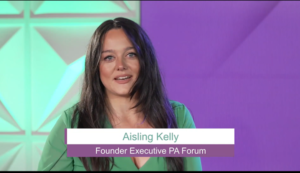
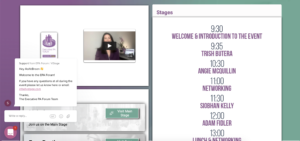
The 3 key themes throughout the course of the 2 day Executive PA Forum were confidence, communications and transformation.
Trish Butera opened Forum day with a stellar insight on the Rise of the Global Assistant - she introduced the talk by defining the crucial skill of Cultural Competence and reminded us that we need to be culturally competent and global-minded in the way we approach our work to be a truly global assistant.
In her usual interactive style, Trish asked everyone a number of questions for the audience to consider, and said we need to understand that cultural competence is more than cultural background, or employee engagement or company culture and goes far beyond that.
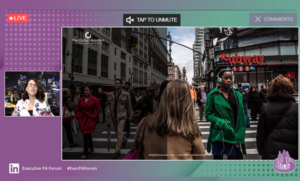
Trish demonstrated that although we share similar values, individually we each have so many different perspectives and when you consider that in the context of an organisation that brings together groups of different people with varying backgrounds and views, those Assistants with highly developed interpersonal skills, self-awareness and other awareness, as well as a growth mindset - are the ones who will succeed in the future of work.
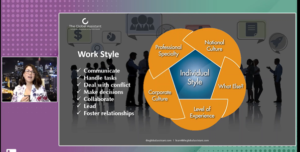
Angie McQuillin then joined us to deliver a presentation on Confidence - Angie's passion in helping people overcome confidence blocks was apparent throughout the presentation. Angie's unique approach around the core of where confidence issues come i.e a place of honesty - being honest with yourself, how that affects your behaviours and attitudes, and how you project that truth in any given moment or situation- is at the core of building your confidence.
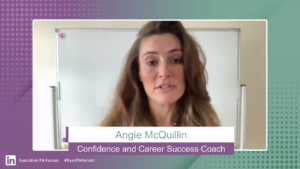
If you don't set boundaries or behave in an honest way on a daily basis then you are sending 'messages of shame' to your brain that are actually taking a chip out of your confidence. i.e 'What other people think and feel is much more valuable and important than what I think and feel' which in turn can make you feel 'less than'. These are stumbling blocks to our own growth and affect our confidence levels on a daily basis.
Angie took us through a number of exercises and diagrams and led us onto the topic of bravery which is what really enables us to have inner confidence.
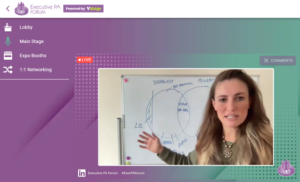
Angie explained that to be brave in overcoming challenges, we have to feel uncomfortable taking action. Bravery happens when you share something or do something that triggers anxiety within you - everyone's level of bravery is different - but if anxiety was not induced then that does not equate to bravery.
It all comes down to our personal growth and where our confidence lies and what that journey looks like for each of us as individuals and this led Angie to sharing with us her 'Stretch Zone' model. She challenged us to stretch ourselves to take action in any area of our life where we are procrastinating and remember that:
'the win comes from taking action and not coming from what other people think and feel as that comes from external rather than internal.'
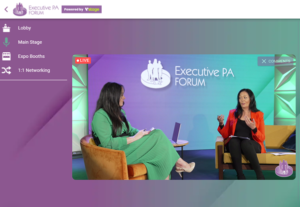
After our morning break Siobhan Kelly, Mosaic Consultancy - our Platinum Recruitment Partner - joined us for an update on the industry and to talk about the frustration she knows that EAs and PAs have with outdated practices of HR and recruiters. She often see jobs advertised that:
-Don't understand the role
-Are unrealistic in their expectations and what they think will attract talent
-Have a lack of awareness around what you do and what you have the capacity to do
Siobhan believes that EAs and PAs should feel empowered to change the direction of not just the office of the executive, but of the whole business.
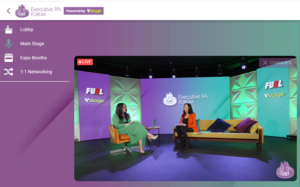
Working across the US and Ireland, Siobhan highlighted how differently the role is viewed across the 2 geographic locations.
She spoke about the rise of the power role of the Executive Assistant - with an EA salary of $100,000+, bonuses and travel allowance on offer for many roles in the US. Before everyone ran to pack their suitcase, she did reassure us that what happens in the US - in particular across MNCs - does slowly filter in to Europe!
Siobhan then shared with us a sample person specification and noted that
'employers are not just looking for what you can do...
they are looking at how you can do it'
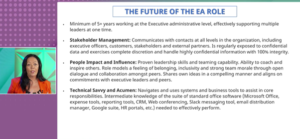
Siobhan gave us her advice on interview techniques and some investigative questions you should ask at interview to help you decide if a role or organisation is the right choice for you. She encouraged everyone to look for feedback from their interviews and pointed out that many people do not realise - that due to GDPR - your notes from your interview must be shared if you request them. Siobhan also shared an insight to her own learnings throughout her own career journey and challenges she has faced in a very honest and motivational account. Our favourite takeaway from her to bear in mind for our careers and life in general was:
'Fear kills more dreams than failure ever will'
We really got to see how amazing the Fuel studios looked throughout the presentation with Siobhan joining Aisling in studio.
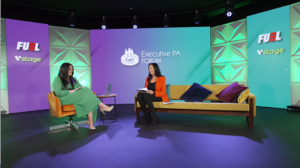
Siobhan’s objective with Mosaic Consultancy is to work from a candidate-centric approach where she partners with each candidate and works with them in a holistic way to help match them with their most suitable employer. If you would like to get in touch with Siobhan for help you can contact: siobhan@mosaicconsultancy.ie
Next up joining us for his keynote on the new paradigm in Executive Support, the Transformational Assistant, Adam Fidler talked us through the changes he has seen in the role over the past 18 months to 2 years and what he believes Assistants need to do to prepare themselves for the future of work.
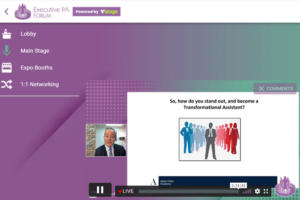
Adam's main points focused on the areas of what you need to do to become a Transformational Assistant, to be transformational in your thinking and your appproach, in your behaviours, habits and attitudes. He advised that to do so you need to maintain performance beyond expectations in times of uncertainty and instability.
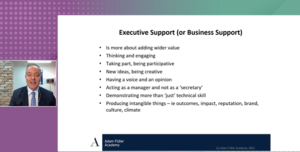
This was a truly ground-breaking insight into Adam’s newest model in Executive Support and we look forward to bringing you further training opportunities with Adam next year where you can learn more about this model as well as the Strategic EA.
After our lunch break we had Rebecca Garvey joining us once again from Own the Room.
This year, Rebecca highlighted that to learn the skills to build authentic connections with your audience, whether you’re communicating to a manager, executive board, or colleagues, you need to get feedback from those around you to ask quality questions to get quality answers. Two such questions should be:
Q1. ‘What went well?’
Q2. What’s one thing I can do to improve?
Rebecca also talked us through some excellent advice to ensure listeners retain more of our message with efficient communication that captures the audience’s attention and respect.
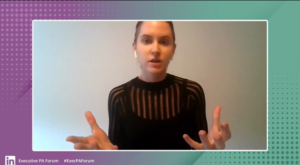
She gave us some 'homework for the rest of our lives'! She advised that anytime someone gives a compliment first say thank you and then count to 5 and don’t undo the thank you – waiting 5 seconds consciously stops you from deflecting from the compliment or downplaying your strengths. Own your worth and build your confidence!
Secondly write down the feedback, keep track on an app on your phone or on your desktop or a notebook – essentially a 'book of evidence' that reminds you of what you have done that has worked out well. Rebecca finished by reminding us to use mirror neurons when we communicate - use the same language and body language to connect with others and another great tip - if we want people to feel passionate about what we are talking about, we have to feel it ourselves first if we want others to feel it!
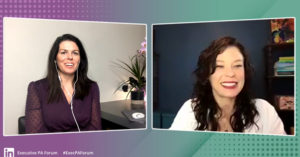
We were honoured to have Monique Helstrom joining us live from Denver Colorado to deliver her signature talk. She gave us a great insight into how she navigated her career managing one of the busiest and most inspirational speaker and in-demand authorities - Simon Sinek.
She reminded us all of something a client once said to her which is something that every Assistant needs to remember:
Thank goodness he has you to get things done, otherwise he would just be some great person with great ideas!
Visionaries need detailed people to get things done – the EA/Executive partnership is a symbiotic relationship and all you need to do is change the narrative on what you tell yourself. If you treat like yourself like you are second best then you will find others treat you that way.
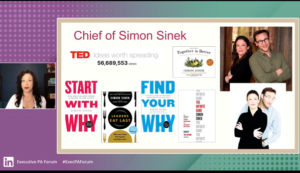
Monique encouraged everyone to identify, accept and use your own natural strengths to stand out and rise. She advised on a number of personality tests she rates to help to understand what makes you unique and where your strengths are, so you can embrace what makes you YOU and work in an career and organisation where you can thrive.
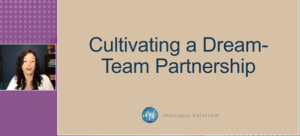
We finished the presentation with a Q&A where Monique generously answered all our questions.
We are thrilled to now offer Monique’s Introduction to Communications Course through our Centre of Excellence, so grab it now at a special price if you book through the booking LINK on our website.

We were delighted to be joined by Brian McDermott and Nikki Tunney, our hosts and partners at Fuel & VStage.
Brian talked through the development of VStage and how they can customise their virtual events platform for your requirements and event objectives.
He highlighted what sets it apart from the rest:
-Customisation – incorporating the look and feel, branding, type of event, matching your production style with what the deliverables are
-Higher level of creativity and input than you would have with other virtual platforms
-Complex security features that can be in line with each organisations’ own IT policies
-Flexible, adaptable and slick
VStage has a number of functionalities including a nifty bespoke photo gallery where you can fully brand the Photobooth area, as demonstrated by Fiona below!
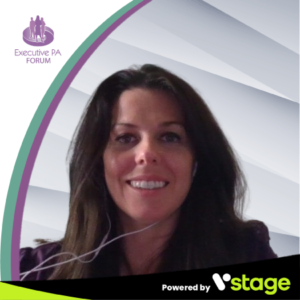
Nikki talked us through what Fuel are up to for Christmas events and what ideas and options that organisations are going for this year.
As many organisations are conscious of ‘Zoom fatigue, Fuel have been extremely busy with virtual events and have been squeezing their creative juices to making their Christmas party nights interactive and engaging for employees.
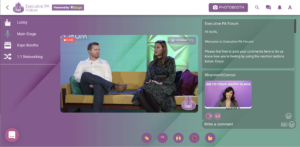
They are also offering a unique corporate gifting experience as a thank you for staff and they have a great expertise when it comes to bespoke idea generation that will reward and show gratitude to employees. We will share the full talk in next week's newsletter but for anyone who would like further information and last-minute ideas coming up to Christmas, contact nikki@fuelhq.ie.
Our last speaker of the day was Lisa Mitten, a former EA and friend of the Forum who is now a Vision & Leadership Mentor.
Lisa spoke to us about creating a powerful vision for yourself and the life and career you want to have.
She shared with us her secrets to becoming an empowered EA and she motivated us all through a unique series of exercises. Lisa advised once we have a strong mindset, a great self-image, and positive self-perception, we can then create clear vision for ourselves:
-Ask 'what do I want'?
-What do I see possible in my role?
-How can this role flourish?
- How can I best serve my Executive and make this relationship the best it can be?
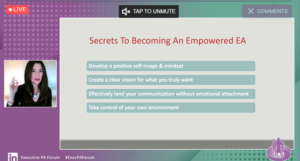
Then you can land your communication effectively and with determination. This also means you can communicate well without emotional attachment.
Lisa advised to not allow others to affect our thinking, we are in control of our own thoughts, how we react to the world around us, we can only control our own attitude, behaviours and habits.
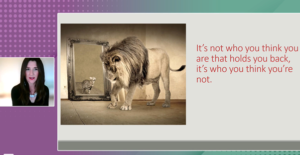
It was a great session to finish the day on and left everyone motivated for the next chapter in their career.
We had great interaction in the chat all day and some of the comments we received included:
'Ladies, your best Forum yet, really interesting, captivating, informative and thought provoking, thanks to you all'
'Thanks Aisling, Fiona and everyone involved in pulling the Forum together. Another valuable day of learning!'
'Thanks so much for another fantastic Forum Day!'
'Thank you Aisling and Fiona especially as it cant happen without all your amazing hard work'
We have to say a massive THANK YOU to all our sponsors and partners for their support - the event simply could not happen without them:
FUEL, VStage, Mosaic Consultancy, One4All, Ireland's Blue Book, Connect Pro, Own the Room and the EA Network Ireland.
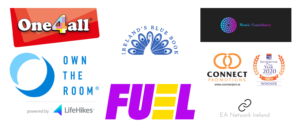
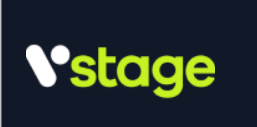
If you were unable to make the Forum this year, but would like access to a limited number of the recorded sessions from Forum Day, then please do get in touch with Aisling - aisling@executivepaforum.com
We can't wait to see you all at the next one!
Coaching and the Benefits for EAs & PAs
You may be the kind of person who coaches others, or you may be the one who is more inclined to seek out coaching for your own development needs. In this article, we’ll take an inside look into coaching and how it can help executives and their assistants excel in the workplace. If you have ever considered coaching but are unsure what the benefits will be for you, read on as we aim to answer all your questions.
When researching for this article, we noted how much overlap there is between the topics discussed by Adam Fidler and Trish Butera at the Executive PA Forum 2020. Adam’s insights regarding building new and future proofed EA capabilities demonstrated how coaching can help assistants to more fully develop their existing skillset.
Likewise, Trish’s discussion on the evolution of the support role demonstrated how the expectations of assistants is evolving, their skill set increasing, and so it is imperative that coaching is available for assistants through the evolution process.
What is coaching and what does it do?
Coaching enables you to make new discoveries and inspires you to grow.
People sometimes confuse coaching with achieving goals, and although coaching can help you to do so, setting goals requires you to take action for a specific outcome.
Coaching on the other hand takes the approach of acknowledging your existing skill set and constantly working on improving it through a long-term and fostering partnership. To put it more simply; a coach (just like in sports) will take you under their wing to teach you how to develop professionally which in turn will benefit the team as a whole.
We asked Trish Butera, Executive Coach and founder of The Global Assistant Online for her opinion:
“The coach-coachee relationship needs to be a supportive one in order to help the coachee develop awareness, thinking and abilities that will help them recognise their strengths and weaknesses. For the coachee, it is a process of guided exploration into their attitudes and behaviours that will have real impact on their professional growth.” Trish Butera explains. “For the coach, it is about understanding, empathy and a practical approach to helping their coachees develop a greater awareness and a mindset shift that will help them achieve clarity and focus to attain their goals and aspirations.”
Many business leaders don’t engage in coaching as they believe this will require a significant amount of time in which they would prefer to use in the running of the organisation for themselves and their colleagues. This however is not the case because a major benefit of coaching – particularly in the current climate and busy-ness of work – is that it takes little time once the initial briefing is done.
Some believe that coaching’s positive business effects is a paradox given that it primarily focuses on personal development rather than business goals. While this may seem true on the outset, when you actually focus on the personal development aspect, you can see that coaching does actually improve business results in that there is a constant flow of dialogue which ensures clarity and expectations, knowledge and skill growth.
Coaching works especially well when employees are aware of their own weaknesses and wanting to overcome them, as well as building on their strengths. Similarly, coaching works well when employees recognize how cultivating new abilities will advance them in their professional career. This is especially true for personal and executive assistants, given the constantly changing environment in which they work.
“The pandemic has forever changed the way we engage in a business environment. It has also changed processes, jobs and the scope of responsibilities and attributes to a whole host of roles, not least those in the admin field,” says Trish. “The employee-centric business dynamic that has emerged since COVID-19 has made executives look to coaching for their support teams as a worthwhile investment for consideration. Coaching for EAs and PAs, particularly those already identified as high-potential employees, is something that a number of progressive and innovative companies are already spearheading. They recognise the value in investing in coaching for one of their most agile, adaptable and broadly skilled employees” she added.
Coaches inspire others by fostering hope and creating a positive vision of the future meaning they tell employees how they are doing, why they are doing certain tasks and how it will help grow them personally.
So how does coaching help Executive and Personal Assistants?
1. Adapting to Change: Change is constantly occurring within the workplace. But change can also be scary especially when it is sudden and unexpected e.g. Covid-19. As an assistant, you have to be there for your Executive throughout the entire change process. If your Executive adopts a coaching approach with you it can help you understand why the change is occurring, the consequences it brings, how to best handle the given change but also knowing you are being supported throughout the occurrence. Coaching through change can shift your mindset from a negative to a positive one and remove the dreaded fear that comes with change in a working environment. Elysia Hegarty at the 2020 Executive PA Forum spoke about the fear of change and how “we need to be fearless and embrace it because that’s when evolution can really happen”. In order for us to become fearless and embrace change, it does help to have guidance and encouragement on how to do so.
2. Improving Productivity and Performance: Coaching can help individuals increase their self-confidence. EA’s and PA’s are sometimes thought to have all the answers. Unfortunately, this is not true. Adam Fidler told us how “approximately 1/3 of ‘routine’ aspects of the PA’s role are already invested in automation”, which suggests there is a need for assistants to be constantly upskilling. Through coaching, EA’s and PA’s can avail of new learnings that will in turn heighten their own belief of their capabilities and also increase productivity as they feel more assured of their potential
3. Feeling Valued: Coaching can remind you of your value and all that you bring to your role, your organisation and your colleagues’ lives. If you are lucky enough to work in an organisation that supports and values you in the same way, you will feel that sense of importance in the organisation but mainly that you are appreciated for all your hard work.
4. Stronger Relationship: The relationship between an executive and their assistant should be one of respect, acknowledgment and value. This is not always the case unfortunately which can result in you feeling lost, unhappy and unmotivated. Coaching actually can help to strengthen the bond between an executive and their assistant. The hierarchy of positions should be invisible and both parties should work together in order to support one another. This is achieved through listening, engagement, understanding, teaching and support. Adam Fidler’s Optimal model for the relationship between CEO and EA is supported through coaching; “you allow your manager to work in the space of leadership and therefore allowing you to work in the space of management”.
5. Coping with Challenges: EA’S and PA’s often have to face challenging situations without any guidance or support. Coaching gives you permission to feel comfortable seeking help on how to cope with a certain challenge. That feeling of shame when wanting to ask for help is eliminated through coaching as a supportive environment is automatically created and nurtured from the beginning. As the EA and PA role evolves, new skills are demanded and coaching on achieving these skills can be very helpful. Trish Butera listed ten skills that are now required of assistants to cope with new challenges arising from the current climate. Within this list includes broad understanding of business concepts, adaptability, leadership, judgement, personal brand awareness, and customer service skills. A great leader will recognise that coaching can help their assistant to develop these skills given many are ones in which a leader would already possess themselves. (Source: CCN.ac.uk)
Considering the evolution of the role and the requirements for EAs & PAs to represent their Executive, and demonstrate executive presence, then it is imperative you prepare yourself as much as possible.
Where do I start when looking for the right coach for me?
We really hope this article has helped you evaluate your own thinking on whether coaching can benefit you.
If you would like to learn more about coaching that we can offer you, visit the Centre of Excellence on our website – you can find Adam Fidler and Trish Butera who both offer solid coaching programmes and as former Executive Assistants they have walked the walk and understand what it is like to be in your shoes.
For more info please contact us at info@executivepaforum.com
Executive PA Forum 2020 - Online and Global
Delivered seamlessly with themes addressing past, present and future, the first ever fully-virtual Executive PA Forum took place last week on the 3rd and 4th of November. This year was particularly special, as we were celebrating ten years of this event.
Due to the current pandemic and ensuing social distancing restrictions, we faced a number of challenges in bringing the event to fruition this year. While we weren’t able to hold the event in person, we’re thrilled that we were still able to provide an interactive, fulfilling, and motivational online learning experience to our growing EA, PA and Administrative Professional community.
The event was hosted and broadcast from Fuel’s stunning Dublin city centre studios. Fuel acted as our hybrid events partner for the event and provided a fully immersive interactive virtual platform on which our delegation attended the event remotely.
Through this platform, we had virtual expo booths with our sponsors, whereby our guests could speak to representatives from our sponsors and partners. We also had a number of networking sessions throughout the two days, in which attendees chose to link up with a specific person, or were matched up randomly.
Over 2 days, we were joined by a host of talented speakers, who covered a range of topics related to all aspects of the EA/PA role, we looked at the job market and industry trends, the benefits of ups-killing and developing new core strengths, as well as ways we can better manage our resilience and cope with stress, avoiding anxiety and burnout. We played a number of bespoke meditations during Forum Day which were delivered at key times throughout by friend of the Forum, Elizabeth Whelan of Zestivo.
To open the event, we heard from Roseanne Connolly, who is a chartered company secretary and chair of the APAI. Roseanne gave an honest and relatable talk about her career journey, how she has managed to deal with her perfectionism streak and subsequent procrastination.
Roseanne also gave invaluable advice on setting boundaries, and how to pull through a confidence crisis, and she talked through the benefits she has gained from her membership of the APAI and involvement in steering the Association in the right direction.
Next up was Rebecca Garvey, communications coach with our Communications Training Partner, Own the Room. Rebecca’s highly interactive provided us with some useful guidelines for how to communicate effectively virtually. Using a number of tried and tested exercises which everyone had the opportunity to practise, Rebecca guided us through a number of key techniques to employ, which we then got to out into practise during the networking breaks.
Elysia Hegarty from Cpl’s Future of Work Institute joined us after our morning break, delivering insights on the current jobs market and trends; the importance of embracing technology and artificial intelligence and using it to your advantage in your career. She also spoke about how the role of the assistant is evolving, the key ‘in-demand’ skills and competencies that employers are now looking for and will be holding in high regard in the future.
Next, our long-time friend of the Forum Adam Fidler took to the main virtual stage. In his engaging presentation, Adam addressed the topic of building new and future-proofed EA capabilities. He emphasised his belief that true executive assistants are not simply ‘admins’ who provide mechanistic support, but who provides intellectual and thinking support, and how EA’s can develop new competencies to add wider organisational value. Adam’s session finished off with a Q&A session hosted by Fiona and covering questions submitted by our attendees.
With a bio reading like the plot of an action adventure film script, Janet Barrett – Executive Assistant at Facebook – took us on her inspiring life journey, recounting her diverse career and the adversity she has faced throughout. Janet offered her advice for keeping calm under pressure and stressed the importance of adaptability and interpersonal communication skills for anyone in an Executive Support role.
As we broke for lunch, delegates were reminded of all the fabulous prizes that were up for grabs with thanks to all our loyal Sponsors & Partners, via the individual Expo Booths.
Trish Butera, founder of the Global Assistant Online joined us live from Sydney with a request for us to rethink how we view the role of an EA. Trish is a cultural competency executive coach and founder of The Global Assistant Online, and in her compelling talk, she gave us further insights into in-demand competencies, and how the traditional framework of the EA has evolved. At the end of the presentation, Fiona conducted an interactive Q&A session and poll with Trish.
In a fascinating presentation, clinical psychologist Elzaan Marnane then spoke about the neuroscience behind impostor syndrome, how and why this condition affects people (particularly women – as a minority – but also male PAs/EAs as a ‘minority within a minority’) and she gave us some fantastic advice on the ways that we can escape our cage and banish impostor syndrome for good.
Joining us as our wonderful co-host for the day, Will Matthews – Head of Business Development at Fuel – then spoke with Ciara Conlon – having worked together before, it was fitting for Will to discuss his own application of the principles that Ciara advocates and had coached him on previously. Ciara spoke about overcoming her own limiting beliefs to enable her to achieve a high-performance mindset, maximising her productivity. The accomplished high-performance leadership coach detailed how we can create positive conscious habits ourselves to impact our behaviours and thoughts by changing our mindset and, among other techniques, starting each day with a ‘game-plan’, so no matter which way you get pulled or how many distractions you have, you can come back to your original game-plan.
We then heard from two of our sponsors: our loyal venue partner, the Radisson Blu Royal Hotel Dublin, and our branded promotions partner, Connect Promotions. Madeline and Michelle from the Radisson gave us a virtual tour of their facilities, showcased their all-new Velvaere spa, and ran a competition with some fabulous prizes for our delegates. Bob Gee from Connect Promotions also gave us a rundown of their offering, highlighting their no.1 for customer service accolade, before giving away a very useful and innovative gift to one lucky winner.
Speaking of innovation, creativity and innovation specialist Gillian Roddie next invited us to rethink how we define what creativity is in her thought-provoking presentation. She also revealed why administrative professionals and assistants are some of the most creative people, as well as giving guidance on incorporating creativity into our roles. The talk was a fantastic base for anyone on Gillian’s workshop on day 2.
Jackie Erskine rounded off Day 1 of the Forum, recounting her experience of finding her tribe of peers and establishing the Belfast PA Network, of which she is the chairperson. She imparted her knowledge on how to effectively maintain a professional network and emphasised the importance of continuous learning and self-development, being the CEO of your own life and embracing your throne.
We finished Day 1 with a recap on the day, and an interview with Aisling and Will from Fuel about the fantastic array of services Fuel provide and their offerings around Christmas, Conferences and Events, hybrid or virtual. We HIGHLY recommend them if you need a robust and reliable virtual platform and a high calibre team of professionals to help you execute your event seamlessly.
Day 2 of the Forum saw a series of interactive workshops from our speakers, some of whom had also joined us the previous day.
–Elzaan Marnane facilitated a session which demonstrated how to manage stress response, recognise the difference between being overwhelmed and being incompetent, and creating a system that allows you to set boundaries effectively.
–Ciara Conlon also returned on workshop day to delve deeper into mastering productivity by creating daily habits and rituals for sustained high performance. Participants took part in a number of exercises which enabled them to reflect and explore their behaviours and habits, and where improvements could be made for greater efficiencies.
-Health and wellness expert Elizabeth Whelan’s timely session was about identifying the causes of burnout, recognising the symptoms, and recovering from this ailment.
–Elysia Hegarty from Cpl returned with an interactive workshop about exploring one’s top values, leaning into one’s strengths, and setting goals that align with them.
–Gillian Roddie also joined us once again, and got the creative juices flowing in an interactive workshop about fostering creativity and tools we can use to adopt creative frameworks that help in pragmatic and practical ways.
-Finally, Corporate and executive coach Aoife Mollin explored the relevant topic of managing change in a positive way. She provided participants with practical tools to help deal with change and took them through the nature and stages of change, with steps to manage change in the future.
One of the pivotal aspects of the Executive PA Forum is the opportunity for our attendees to connect with each other and share their experiences and contacts. Therefore, it was only fitting to finish off the event with a virtual networking session.
We would like to thank everyone who came together to make the 2020 Executive PA Forum a memorable experience for all involved. Each year we are touched to see how motivated, inspired and fulfilled our delegates are after attending the event.
We are so grateful to our sponsors and speakers for their hard work and commitment to the Forum, especially during such a challenging year, and we ask you to keep them in mind for your requirements over the coming months and year.
Be sure to keep an eye on our e-mails and social media for further training and development through our Centre of Excellence for 2021, as well as announcements on key dates for Forum 2021!


How to be a PA Productivity Pro with Cpl Office Support
How to be a PA Productivity Pro, by Kristin Keogh, Cpl Office Support

Within our Office Support recruitment team, I specialise in recruiting for PA/EA’s and know these roles inside out. Having worked as a personal assistant myself in the past, it makes my job a little to know what skills are needed and spot a good EA during the hiring process.
One of the main skills a good PA or EA needs is excellent time management and productivity, in order to get the job done. Although ideally, most roles are 9-5, a personal assistant often requires flexibility and to go above and beyond to get the work done.
If you manage your time wisely and be more productive will help you obtain a much better work life balance and enjoy your role.
Some tips below that may help you with this.
Prioritise
 As a PA you will often be juggling multiple Executives and responsibilities at a time, this can make it difficult to prioritise. What you need is to have a good understanding of what is important in your company.
As a PA you will often be juggling multiple Executives and responsibilities at a time, this can make it difficult to prioritise. What you need is to have a good understanding of what is important in your company.
Being aware of this will help guide you on the urgency of each task given. For example, things that will need to be completed asap to avoid any repercussions or that may have a negative impact on any Executive.
Sometimes you may need to make that judgement call but if the important duties are building up and this is becoming different don’t be afraid to let your Executive know. Not everything will be as urgent as they maybe have initially implied.
Plan ahead
If you have a weekly, bi-weekly, or monthly meeting or event, a lot of the time the content or structure will be the same. If this applies to your role, planning ahead will limit the time that will be required for the following meeting.
This may sound like common sense, but you would be surprised at how being extremely organised in advance will take some of the pressure off when the next event occurs.
Communication is key
This is a huge part of being productive. If you don’t speak up when things are beginning to get on top of you, no one will be any wiser and everything will be expected to go smoothly. We all know that when you are stressed and overwhelmed this is when disasters can happen.
While mistakes can happen, they can also be avoided if you just communicate with your Executive or team if assistance is required or if you need guidance on urgent tasks to ensure everything is done correctly and efficiently.
Taking control of your day & being ahead of the game
Obviously, as a PA your role and tasks will differ from day to day based on your Executives requirements, but you will also likely have a lot of things carrying over from the previous day. At the beginning of each day ensure you write up a to-do list and tick off your tasks as you go along.
Print of a copy of your Executives calendar so you have to hand and are aware of what he has coming up ahead of the game. This will help to keep you on track and ensure that you are not missing anything. Being proactive can also ensure that you are working on the right things and completing tasks that are increasing your Executive’s productivity.
Be assertive
As a PA you are likely to be inundated with tasks from your team as well as the Executive(s) that you are supporting. Don’t be afraid to push back a little. You are only one person and if you feel that your day is filling up fast with ‘urgent’ tasks from different people make them aware of this.
Taking on too much will add to your stress and its likely that you won’t complete every task if this is the case. Being a little assertive will help you manage what is most important in your day.
It’s the nature of the role to be busy and for each day to bring its own unique challenges, but a good PA will be prepared and plan their time so that urgent requests can be met. If you’re struggling in your current role or would like to chat about opportunities get in touch – I’d be happy to advise.
Kristin.keogh@cpl.ie
Rebecca Garvey

Rebecca believes that as a Coach, be it public speaking with Own The Room, coaching people on the gym floor or giving one to one consultations as a trained nutritionist, it is an honour to be involved in someone’s shift in mindset, to see their self belief grow and their confidence soar.
In 2015, Rebecca received a Masters from Oxford Brookes in Applied Human Nutrition and became a Certified Strength and Conditioning Trainer. Since then, she’s worked as a health coach with Google and Spectrum Health, regularly leading 200+ person workshops at companies like Vodafone, Microsoft, Azzure and Siemens.
From starting her own health pop up café, while living in Australia, becoming a trained phlebotomist (that’s right she can legally draw blood) to leading a global wellness programme in Dominica, Rebecca demonstrates her passion for wellness in everything she does. Although a New York City marathon veteran, Rebecca spends most of her free time power lifting, enjoying rugby and training for adventures such as climbing Kilimanjaro.
Trish Butera

Patricia (Trish) Butera is an intercultural business advisor, executive coach and cultural competence trainer based in Sydney, Australia. She is the founder of 60ZONE Pty Ltd, a consultancy established in 2014 which brings together subject-matter experts to assist organizations in leveraging cultural intelligence for global strategic engagement.
Before 60ZONE, Trish was an international executive assistant to a HNWI. She has leveraged her extensive knowledge of the role and its stakeholders to develop cutting-edge global skills training programs for administrative support professionals. This content is now available through The Global Assistant Online an e-learning platform exclusive for executive support professionals in multinational organizations.
Trish has developed training programs for diverse organizations across industry sectors including banking, academia, finance, pharmaceutical and hospitality. She has partnered with HR specialists to provide customized L&D content and facilitated over 1000 hours of onsite and online training events in the areas of cultural awareness, cross-cultural communication, event protocol and intercultural protocol.
She consults to global mobility organizations in the US and EU, providing intercultural training and coaching for senior executives from Forbes Global 500 companies.
Trish holds an Executive Diploma in Soft Diplomacy & Cross-Cultural Communications from the International School of Protocol & Diplomacy, Belgium, Diplomatic and International Protocol credentials from Geneva, USA and UK institutions. She is a Certified Intercultural Consultant with Aperian Global and BGRS.
